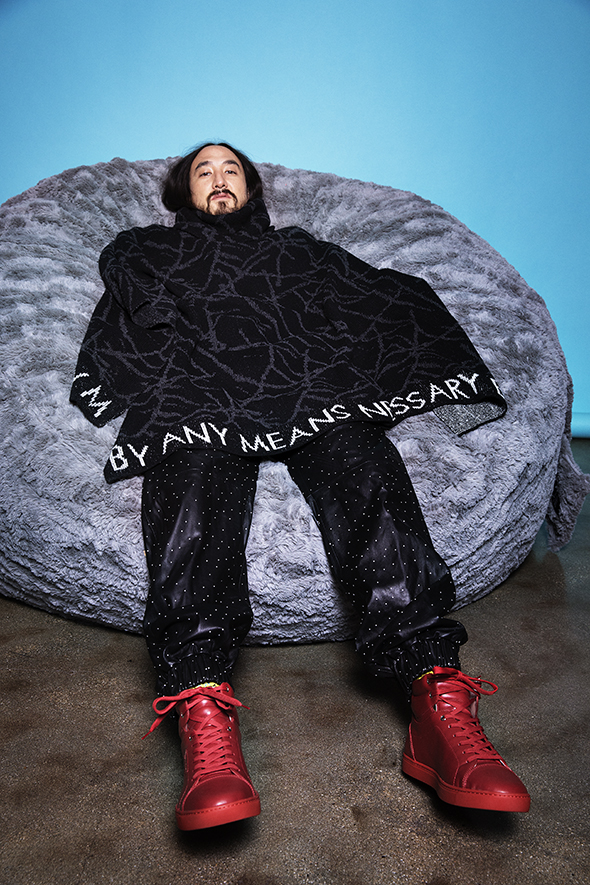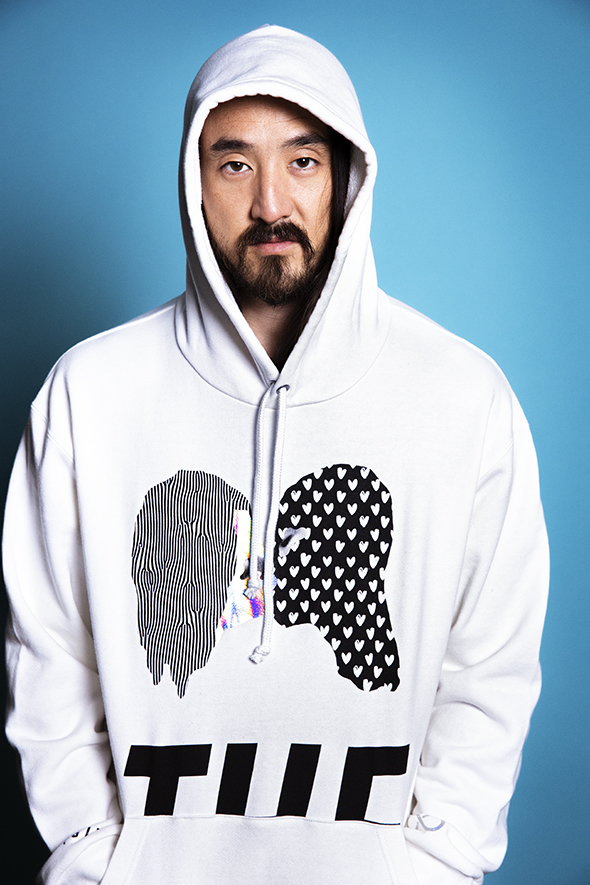Living His Truth, By Any Means Necessary

Steve wears
Dim Mak top & poncho
Bruno Magli pants
Dolce & Gabbana sneakers
At the Dim Mak Grammy after-party, everyone was looking to be seen and heard in the heart of one of Hollywood’s hottest scenes. Selfies were rampant, glitzy outfits and jewelry sparkled under the club’s pink-tinted lights, and tequila shots were passed around like candy as the crowd anxiously awaited the arrival of their DJ host: Steve Aoki. Aoki would be arriving from the Grammys, where he had just received his second nomination for his music featured in I’ll Sleep When I’m Dead, the Netflix documentary about his own life.
About a quarter to midnight, Steve Aoki took the stage behind the turntables and the bass hit the crowd like a defibrillator. With the spirit of a renegade kid at a punk rock concert, Aoki’s contagious energy became an electrical current surging through the crowd. He threw his hands in the air like a sorcerer’s apprentice who had just discovered his magical powers, conducting a spellbound audience. The audience turned their phones away from themselves and pointed them toward the stage. Their lit-up screens dotted the crowd like stars in an EDM universe that Steve Aoki created.
As Founder of Dim Mak Records and an iconic DJ in his own right, Steve Aoki has been a staple in defining the current EDM scene. In 1996 at just 19 years old, he started the Dim Mak label which has since put out almost 900 releases. As a solo artist, Steve Aoki’s 2012 album, Wonderland, was a career milestone that earned him a Grammy nomination for best Dance/Electronica Album. Since his last 2015 album, Neon Future II, Aoki has been in and out of the studio these past two years dropping multiple singles in collaboration with big names like Adam Lambert, Louis Tomlinson, and 2 Chainz. The new album he’s currently working on pushes the envelope even further, featuring cross-genre pieces in collaboration with unique artists like country band, Lady Antebellum.
While cake-throwing and crowd-surfing on an inflatable raft at his live concerts helped him gain international fame, Aoki revealed that when he was starting out, fame and fortune were the farthest things from his mind. “I didn’t think I was going to be commercially or financially successful,” Aoki says. “Actually that would have been a deterrent. When you’re a punk kid playing to around 50 people in your living room, you don’t think ‘I’m gonna be rich or famous,’ nor do you care about that. That’s not exciting to me. I get more excited when I see a kid singing one of my songs. You want to make a real connection with people.”
When I sat down with Steve Aoki, we bonded over the fact we were both alumni of the University of California, Santa Barbara. Receiving his degree in Women’s Studies, Aoki said that grassroots organizing and his communal, activist lifestyle helped to solidify his foundational “do-it-yourself” philosophy. This fundamental ideology helped Aoki overcome hurdles, which included growing up with racial prejudice. His pursuit of music was a form of activism in and of itself: a resistance to the status quo.
“I grew up in a 96% white neighborhood. When something is so one way, there’s very little accountability in respecting difference. When everything is red, and a blue comes in, and red doesn’t like blue, no one in the whole red category says it’s not right to say that. But I’m absolutely thankful that I lived there, because I probably wouldn’t have found a guitar in my hand, or a microphone, or found a scene that said, ‘Hey, you have a voice here. It’s okay.’”

Steve wears
Dim Mak hoodie
Saint Laurent jeans
Adidas Originals by PharrellWilliams sneakers
Aoki’s overcoming of adversity eventually led him to develop the Dim Mak mantra, “By Any Means Necessary.” It embodies the idea that with commitment and extreme dedication, obstacles can be overcome, and life can become a road map of endless possibility.
Over the years, Dim Mak has evolved into a lifestyle brand, integrating its identity with the fashion world. Aoki recently debuted his unisex 2017 Winter Collection at New York Fashion Week. In the spirit of Aoki’s iconic sense of showmanship, the models wearing Aoki’s fashion line were skaters, and the runway was a halfpipe. The line seems to be the true embodiment of Aoki’s roots, featuring a melding of Japanese and SoCal skater streetwear. Aoki himself made an appearance as a skateboarding model, gliding up the halfpipe wearing black and white, ink-streaked pants and a graphic t-shirt underneath a dark denim jacket. Steve Aoki brought an unforgettable show to the New York runway, infusing it with the same passion and reckless abandon he brings to his live concerts.
“We wanted to show not only the energy and attitude of Dim Mak, but also the movement and the flow of the clothes. It was so incredibly well received. It’s a big deal, because it’s one thing to do a show, and it’s another to have some really powerful figures in fashion give you the nod. I was screen-printing t-shirts since I was 15, and doing all the Dim Mak merchandise and selling it at shows, so all this is so important to me.”
Steve Aoki’s new Spring Collection takes on a different personality from the one featured on the halfpipe runway. The color palette features more light grays and blues, and the collection can only be described as moody, with an undertone of anarchy and attitude. The collection takes inspiration from the French film, La Haine (1995), a black and white film about the lives of three young men in the French suburbs the day after a violent riot. Aoki held up one eye-catching t-shirt in particular: the graphic was of a man postured to challenge the viewer, and featured a unique patchwork of pattern and texture.
“We did a collaboration with these artists named Cyrcle based in LA, and I love these guys. We put holographic elements on our t-shirts. To produce this shirt is ridiculously expensive, so we don’t make a dime on the collection. We’re selling it at a price point where we don’t make any money, so this is not about profit margins at all.”
It didn’t surprise me that Aoki was willing to sell his collection at such a low price point. The more I spoke with Aoki, the more there seemed to be a running theme of generosity throughout his actions. Even when he was starting out, Aoki was more willing to give his music away than sell it. EDM.com named him number one on their list of most charitable EDM producers. He used his platform to create the Steve Aoki Charitable Fund which has helped support organizations in brain science and research, as well as humanitarian causes such as disaster relief, developmental disabilities, and animal rights. Steve Aoki is generous with his performances as well, putting careful thought into creating an all-encompassing sensory experience for his audience.
“What I see as far as shows, you go there for an all sensory experience. So what you see, what you hear, taste-cake, what you feel, that’s all going to be part of your experience. When I have a show, I create a memory that people cherish. I love to play the shows. I really put in 110%. I could be as sick as a dog, I could be injured, but I’ll still put in 110%.”
From starting his own label without any prior knowledge to creating an entire fashion line, Aoki is the type of person willing to fearlessly try everything. I asked him what keeps him from second-guessing himself when he’s venturing into unfamiliar territory.
“Once you try something new, it’s no longer foreign to you, you just got to attempt it. The attempt is the hardest part, going from visualization to actual action. Everyone has the ability. There’s nothing profound about my life, I’m not extraordinary. All skill is, is experience. It’s just like learning a kick-flip. Some people can learn it faster than others. I’m the slow guy who doesn’t learn the kick-flip so quickly. So I have to put in the hours, but when you do it like that, you’re used to the grind and I love the grind. I can’t live without the grind.”
Steve Aoki may say he’s not extraordinary, but I have to respectfully disagree. Aoki speaks to the dreamer in all of us. He’s the man who took a leap of faith and dared to live his truth, and that’s what makes him exceptional. People gravitate to his passionate performances and the music he creates, but for all the love and attention he receives from his fans, Aoki reciprocates it back tenfold. He’s a moving train with no signs of slowing down, giving everything he has to bring his creative vision into fruition and share it with the world. By Any Means Necessary.
Text by Zee Chang
Photography by Richard Reinsdorf
Grooming by Will Carrillo
Styling by Rima Vaidila
Crew Alex Quel, James Moy
Production by Keith Carhill

